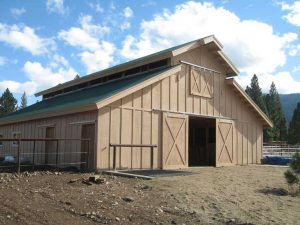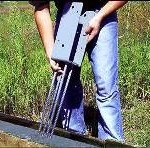Safe disposal of hazardous chemicals can be a challenge for businesses, residents and landfills.
Plymouth County, Iowa came up with a solution, which involved the construction of an approximately 60 by 70 foot pole building. The Regional Collection Center (RCC) encompasses an about 30-by-60-foot space inside.
The remaining space is for landfill storage.
An about 9-by-9-by-16-foot explosion-proof room, for storing hazardous chemicals, was built onto the RCC side of the new building. The explosion-proof room has an automatic dry chemical suppressant system and blow-out paneled walls.
Per Mark Kunkel, Plymouth County landfill manager, “If something blows up, the panels go backward,” Kunkel explained.
In the RCC area, there is also an emergency shower and eye wash station, along with a pit and a sealed floor in case of spills.
The county landfill is “a one-stop shop”, as county residents can now take, not only garbage, but also hazardous chemicals to the landfill for safe disposal.
In the case of Plymouth County, residents have to set up an appointment. A fee will be charged to dispose of some materials such as latex paint, farm chemicals and commercial chemicals, Kunkel said. He said the fee will help cover expenses the landfill will incur with its new collection center.
Commercial businesses which use more than 2,200 pounds of chemicals a year will not be able to dispose of those materials at the landfill, Kunkel said.
Also, any commercial chemicals must be on an Environmental Protection Agency approved list to be accepted at the landfill, he said.
Fees will not be charged to residents wishing to dispose of household materials such as batteries, lawn fertilizers and garden chemicals.
People may also choose to take advantage of a “swap shop” in the RCC, Kunkel said.
“As people bring in different products, if they are still good, they are free to everyone,” he said.
Construction and material costs for the RCC building and explosion-proof room were about $215,000, Kunkel said.
The landfill received two DNR grants to help offset those costs.
A $37,000 grant was awarded for construction of the explosion-proof building, Kunkel said.
The DNR also awarded a $19,700 grant to purchase materials for opening the RCC, including a mobile trailer, he said.
“We plan to go to different towns throughout the summer,” Kunkel said.
The remainder of the RCC construction costs is being paid by the solid waste agency board through a low-interest loan, Kunkel said.
“This is a service to the residents of Plymouth County,” he explained. “It’s a way to get rid of hazardous chemicals.”
Keeping those materials out of the landfill is important because there is always a chance of leaking into groundwater sources, Kunkel said.
The pole (post frame) building brings an affordable solution to what would otherwise have been an expensive proposition.









